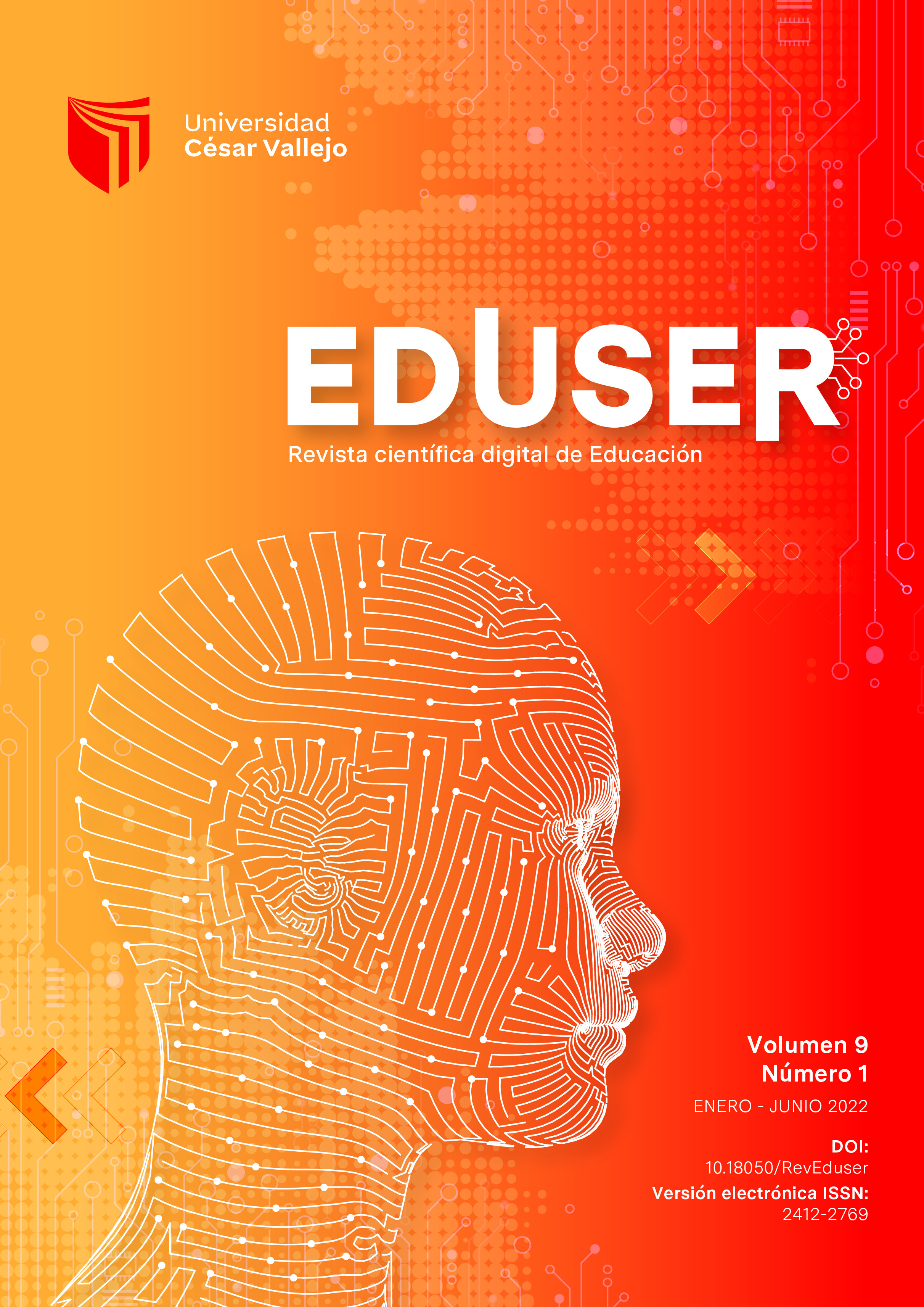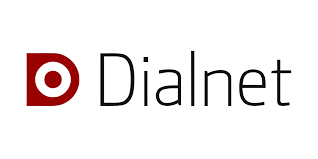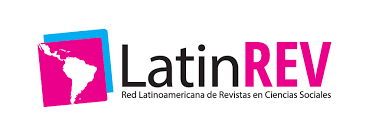Digital Competence in teaching performance in a Primary level educational institution
DOI:
https://doi.org/10.18050/eduser.v9n1a3Keywords:
Education, Digital competence, learning, innovationAbstract
Education has undergone tremendous changes, including providing a dynamic process between teachers and students. The purpose of this study was to determine the incidence of digital competence on teaching performance in primary level educational institutions. The quantitative approach was assumed, following a basic type of research, non-experimental design and cross-sectional level of causal description. The non-probabilistic sampling method was used, two questionnaires were administered to 85 elementary school teachers. The results were analyzed using ordinary linear regression statistics. To test the research hypotheses, a Nagelkerke R2 of 0.578 was obtained, which explains the variability in the data and identifies the effect of numerical skills on academic performance at 57.8%. A significance, p=0.000 representing that p is less than the significance value of 0.05, which means that the event is significant. It was concluded that digital skills have a significant impact on teaching performance in an elementary school.
References
Al-Zabaneh, K. A., & Al-Zboon, E. K. (2020). Using assistive technologies in the curriculum of children with specific learning disabilities served in inclusion settings: Teachers' beliefs and professionalism. Disability and Rehabilitation: Assistive Technology, 1(1), 1– 11. https://doi.org/10.1080/17483107.2020.1752824
Alexopoulou, A., Batsou, A., & Drigas, A. S. (2019). Effectiveness of assessment, diagnostic and intervention ICT tools for children and adolescents with ADHD. International Journal of Recent Contributions from Engineering, Science & IT (iJES), 7(3), 51– 63. https://doi.org/10.3991/ijes.v7i3.11178
Álvarez, R.F. (2019). Epistemología e identidad científica. Dictamen Libre, 12, 43-63. https://doi.org/10.18041/2619-4244/dl.24.5464
Aparicio, O. Y. (2019). El uso educativo de las TIC. Revista Interamericana de Investigación Educación y Pedagogía RIIEP, 12(1), 211-227. https://doi.org/10.15332/s1657-107X.2019.0001.02
Arancibia, M. L., Cabero, J., y Marín, V. (2020). Creencias sobre la enseñanza y uso de las tecnologías de la información y la comunicación (TIC) en docentes de educación superior. Formación Universitaria, 13(3), 89– 100. https://doi.org/10.4067/S0718-50062020000300089
Blagoev B.H., Muhr S.L., Ortlieb R.J. & Schreyögg G.K. (2018) Organizational working time regimes: Drivers, consequences and attempts to change patterns of excessive working hours. German Journal of Human Resource Management. 32(3-4):155-167. https://doi.org/10.1177/2397002218791408
Blau, I., Shamir‐Inbal, T., & Hadad, S. (2020). Digital collaborative learning in elementary and middle schools as a function of individualistic and collectivistic culture: The role of ICT coordinators' leadership experience, students' collaboration skills, and sustainability. Journal of computer assisted learning, 36(5), 672-687. https://doi.org/10.1111/jcal.12436g
Cabero, J. y Palacios, A. (2020). Marco Europeo de Competencia Digital Docente «DigCompEdu». Traducción y adaptación del cuestionario «DigCompEdu Check-In». Edmetic, 9 (1), 213-234. https://doi.org/10.21071/edmetic.v9i1.12462
Cervera, M. G., Martínez, J. G., y Mon, F. M. E. (2016). Competencia digital y competencia digital docente: una panorámica sobre el estado de la cuestión. RIITE Revista Interuniversitaria de Investigación en Tecnología Educativa, (0) https://doi.org/10.6018/riite2016/257631
Cortés, A., Moyano, N., & Quílez, A. (2019). The Relationship between executive functions and academic performance in primary education: Review and meta-analysis. Frontiers in Psychology, 10, 1-18. https://doi.org/10.3389/fpsyg.2019.01582
Cuetos, M. J., Grijalbo, L., Argüeso, E., Escamilla, V., y Ballesteros, R. (2020). Potencialidades de las TIC y su papel fomentando la creatividad: percepciones del profesorado. RIED-Revista Iberoamericana De Educación a Distancia, 23(2), 287–306. https://doi.org/10.5944/ried.23.2.26247
Defensoría del Pueblo (2020). La educación frente a la emergencia sanitaria. Defensoría del Pueblo. https://cdn.www.gob.pe/uploads/document/file/1252037/Serie%20Informes%20Especiales%20N%C2%BA%20027-2020-DP%20La%20educaci%C3%B3n%20frente%20a%20la%20emergencia%20sanitaria.pdf
Estrada, E. G., y Mamani, M. (2021). Competencia digital y variables sociodemográficas en docentes peruanos de educación básica regular. Revista San Gregorio, 1(45), 1-16. https://doi.org/10.36097/rsan.v0i45.1502
Espinoza, I. F. (2020). Epistemología y metodología de investigación en administración en universidades de Lima y Junín. Horizonte De La Ciencia, 10(19), 130-146. https://doi.org/10.26490/uncp.horizonteciencia.2020.19.593
Flores, M., Ortega, M., & Sousa, C. (2021). The use of digital ICT by teachers and their adaptation to current models. Revista Electrónica Educare, 25(1), 1-21. https://doi.org/10.15359/ree.25-1.16
Flores, L., & Meléndez, C. (2021). Comparative analysis of b-learning and e-learning in ICT competencies for teaching in higher education. Revista Innova Educación, 3(4), 173–190. https://doi.org/10.35622/j.rie.2021.04.013
García, J.F., y García, S.D. (2021). Uso de herramientas digitales para la docencia en España durante la pandemia COVID-19. Revista Española de Educación Comparada, (38), 151–173. https://doi.org/10.5944/reec.38.2021.27816
Gonzáles, J.M., Ramirez, R.L., Terán, N.T., y Palomino, G.P. (2021). Clima organizacional en el sector público Latinoamericano. Ciencia Latina Revista Científica Multidisciplinar, 5(1), 1157-1170. https://doi.org/10.37811/cl_rcm.v5i1.318
González, M.-D., Abad, E., & Belmonte. L. J. (2020). Meaningful learning in the development of digital skills. Trend analysis. IJERI: International Journal of Educational Research and Innovation, (14), 91–110. https://doi.org/10.46661/ijeri.4741
Hernández, R. M., Sánchez, I., Zarate, J. R., Medina, D., Loli, T. P., y Arévalo, G. R. (2019). Tecnología de Información y Comunicación (TIC) y su práctica en la evaluación educativa. Propósitos Y Representaciones, 7(2), 01–10. https://doi.org/10.20511/pyr2019.v7n2.328
López, E. C. I., y Escobedo, F. E. (2020). Conectivismo, ¿un nuevo paradigma del aprendizaje? Desafíos, 12(1), e259. https://doi.org/10.37711/desafios.2021.12.1.259
Lévano, L., Sánchez, S., Guillén, P., Tello, S., Herrera-, N. y Collantes, Z. (2019). Competencias digitales y educación. Propósitos y representaciones, 7(2), 569-588. https://dx.doi.org/10.20511/pyr2019.v7n2.329
Margevica, I., & Smitiņa, A. (2021). Self-assessment of the digital skills of career education specialists during the provision of remote services. World Journal on Educational Technology: Current Issues, 13(4), 1061–1072. https://doi.org/10.18844/wjet.v13i4.6296
Martínez, A. J. R. (2021). Competencias digitales docentes y su estado en el contexto virtual. Revista peruana de investigación e innovación educativa, 1(2), e21038-e21038. https://dx.doi.org/10.15381/rpiiedu.v1i2.21038
Martínez, J., y Garcés, J. (2020). Competencias digitales docentes y el reto de la educación virtual derivado de la covid-19. Educación y humanismo, 22(39), 1-16. https://doi.org/10.17081/eduhum.22.39.4114
Ministerio de Educación (2012). Marco del buen desempeño docente. www.minedu.gob.pe/pdf/ed/marco-de- buen-desempeño-docente.pdf
Ministerio de Educación del Perú. (2020). RVM_N__097-2020-MINEDU https://cdn.www.gob.pe/uploads/document/file/733624/RVM_N__097-2020-MINEDU.pdf
Ñaupas, H., Mejía, E., Novoa, E. y Villagómez, A. (2018). Metodología de la investigación: Cuantitativa – cualitativa y redacción de tesis. 5ta Edición de la U. https://edicionesdelau.com/producto/metodologia-de-la-investigacion-cuantitativa-cualitativa-y-redaccion-de-la-tesis-5a-edicion/
Palacios, R. A. y Martín, L. (2021). Formación del profesorado en la era digital. Nivel de innovación y uso de las TIC según el Marco Común de referencia de la Competencia digital docente. REVIE - Revista de Investigación y Evaluación Educativa, 8 (1), 38-53. https://doi.org/10.47554/revie2021.8.79
Pascale, R.J. (2019) Forget about ‘the ideal worker’: A theoretical contribution to the debate on flexible workplace designs, work/life conflict, and opportunities for gender equality. Business Horizons, 4(15) 603-613. https://doi.org/10.1016/j.bushor.2019.04.003
Pashanasi, A. B., Gárate, J.R., & Palomino, G.P. (2021). Desempeño laboral en instituciones de educación superior: una revisión Latinoamericana de literatura. Comuni@cción: Revista de Investigación en Comunicación y Desenvolvimiento, 12(3), 163–174. https://doi.org/10.33595/2226-1478.12.3.537
Pacheco, A. H., Chuquillanqui, R. V., Ortiz, S. E. P., y Borja, K. M. H. (2021). Competencias digitales y desempeño docente en la Universidad Nacional del Centro del Perú. Investigación y Educación, 2(1), 55-65. https://doi.org/10.26490/uncp.investigacionyeducacion.2021.2.1.136
Portuguez, J. M. ., Medina de Véliz, L. F. L. ., Alanya Coras, E., & Castro Palomino, L. (2021). Competencia digital y desempeño docente en el Perú. Revista De Propuestas Educativas, 4 (7), 44–53. https://doi.org/10.33996/propuestas.v4i7.774
Rodríguez, J. A. C. (2021). Principales corrientes y tendencias a inicios del siglo XXI de la Pedagogía y la Didáctica. Editorial Pueblo y Educación. https://books.google.com.pe/books?hl=es&lr=&id=-xcaEAAAQBAJ&oi=fnd&pg=PA8&dq=Rodr%C3%ADguez+(2021)&ots=e_tzu8901B&sig=V3bCtmTZ5vjMdt1a4e8m0nl55Ck#v=onepage&q=Rodr%C3%ADguez%20(2021)&f=false
Sfredo, M. L., & Silva, R. R. D. da. (2021). Pedagogical efficiency and the brazilian development project: fundamentals of ‘neo-teaching’ in secondary education. Acta Scientiarum. Education, 43(1), e48270. https://doi.org/10.4025/actascieduc.v43i1.48270
Sibylle, D.N. & Norbert K.S. (2021) Women and men in leadership positions: health and work-related attitudes and their associations with work-related stressors, private stressors, and privacy-work conflict. Zeitschrift für Arbeitswissenschaft 75(1), 29-45. https://link.springer.com/article/10.1007/s41449-020-00203-0
Tammy, D.A., Kelsey, F.R., Roxanne C.L., Jeremiah, S.R. & Cheryl, E.G. (2021) Boundary Management and Work‐Nonwork Balance While Working from Home. Applied Psychology 70(1), 60-84. https://iaap-journals.onlinelibrary.wiley.com/doi/10.1111/apps.12300
Organización de las Naciones Unidas para la Educación, la Ciencia y la Cultura -UNESCO- (2019). Estándares de competencia en TIC para docentes. Londres UNESCO https://eduteka.icesi.edu.co/pdfdir/unesco-competencias-tic-docentes-version-3-2019.pdf
Xi, W.C. & Shirle, T.Y. (2021) Extending Work-Life Balance Initiatives. Handbook on Management and Employment Practices, 13(4) 1-16.
Zafra, S, Nieto, Z y Parra, H. (2018). Interpretación de las competencias digitales profesorales presentes en el contexto universitario. Revista Logos Ciencia & Tecnología, 10(1), 41-51. http://repositorio.ufps.edu.co/handle/ufps/1294
Zeballos, M. (2020). Acompañamiento Pedagógico Digital para Docentes. Revista Tecnológica-Educativa Docentes 2.0, 9(2), 192-203. https://doi.org/10.37843/rted.v9i2.164
Additional Files
Published
How to Cite
Issue
Section
License
Copyright (c) 2024 Sujeidy María Cotohuanca Cruz, Yenny Jackeline Saravia Ramos

This work is licensed under a Creative Commons Attribution 4.0 International License.













